James Landale
Diplomatic correspondent in Banff, Alberta

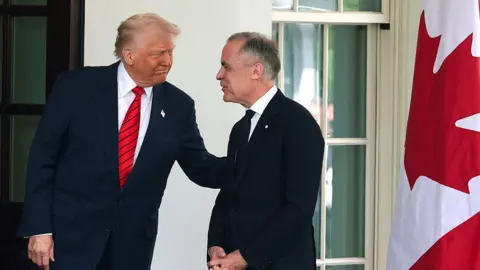 Getty Images
Getty Images
Donald Trump greets Mark Carney in May 2025.
This week's G7 summit in Canada will be dominated by war - only not one of those that the world leaders had expected.
High on the agenda had been Russia's war against Ukraine and Donald Trump's tariff war against America's trading partners.
Instead the three-day gathering in the Rocky Mountains of Alberta will inevitably be focused on war in the Middle East.
Israel's decision to attack Iran will force the Group of Seven western powers to spend less time on other issues and instead discuss ways of managing the conflict.
Like so many of their discussions, that will involve Britain, France, Germany and Italy - along with Canada and Japan - seeking to influence the United States.
For although Israel might have launched these strikes without explicit American support, the US president is the only leader with real leverage over Prime Minister Benjamin Netanyahu.
The G7 leaders, due to arrive in Canada on Sunday, know the global security and economic risks if this conflict escalates, dragging in other countries, sending oil prices soaring.
Yet they may struggle to achieve a common position. Some, such as UK Prime Minister Keir Starmer and President Emmanuel Macron of France, have called for restraint and de-escalation.
But others such as Japan's Prime Minister, Shigeru Ishiba, have condemned Israel's attack as "intolerable" and "extremely regrettable". For his part, Mr Trump praised Israel's strikes as "excellent".

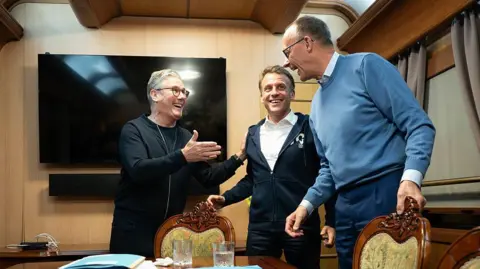 Getty Images
Getty Images
UK Prime Minister Sir Keir Starmer meets with French President Emmanuel Macron and German Chancellor Friedrich Merz in Ukraine in May 2025.
Hiding the divisions
All this is a long way from what Mark Carney, the new Canadian Prime Minister, had planned for the talks in the wilderness retreat of Kananaskis. He wanted a summit to mark the G7's 50th birthday that avoided rows with Mr Trump.
Much of his agenda was non-controversial, about energy security, protecting mineral supply chains, accelerating the digital transition and tackling forest fires.
There was little mention of issues such as climate change, on which Mr Trump is a sceptic. Canadian officials even decided not to have a summit communique to avoid textual disputes dominating the gathering.
Instead, world leaders will agree a number of "short, action-oriented statements" that maintain consensus and ignore divisive issues.
Canadians well remember the last time they hosted a G7 gathering in 2018 when there was a row over - yes - Donald Trump's trade tariffs. The president stormed out early and, on the plane home, withdrew his support for the summit communique after watching Justin Trudeau, the then Canadian Prime Minister, give a press conference Mr Trump described as "very dishonest and weak".
This summit Mr Carney may arrange a visit to Kananaskis golf club to try to keep Mr Trump onside.

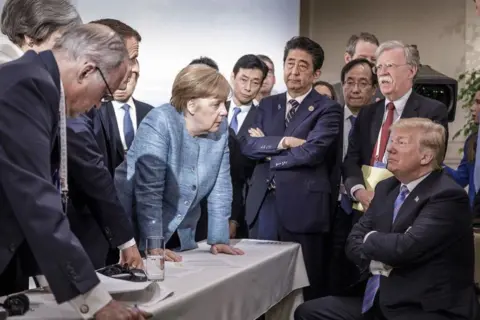 EPA
EPA
In Charlevoiz in 2018, it was a discordant G7 hosted by Canada and Trump left early
An awkward family gathering
Beneath this caution lingers a fundamental question about whether these annual gatherings are still worth it, given Mr Trump's clear disdain. He prefers bilateral dealmaking to multilateral consensus-building.
This is the president's first such foray onto the world stage since his inauguration and his six partners will be looking anxiously to see whether he wants to pick a fight - or look statesmanlike - for voters back home.
Max Bergmann, director of the Europe, Russia and Eurasia Program at the Center for Strategic and International Studies, said: "The question now is not so much 'is this an awkward family gathering?' That's almost a given. I think the question is: 'is this still a family?'"
In one respect, the dramatis personae in Kananaskis helps. There are several new faces around the table - Sir Keir Starmer, Chancellor Merz of Germany, Mr Ishiba and Mr Carney himself. The more veteran G7 leaders - President Macron and Prime Minister Meloni of Italy - get on well with the US president.
Other leaders also attending the summit, from Mexico, India, Australia, South Africa, South Korea and Brazil, are not expected to pick a fight.

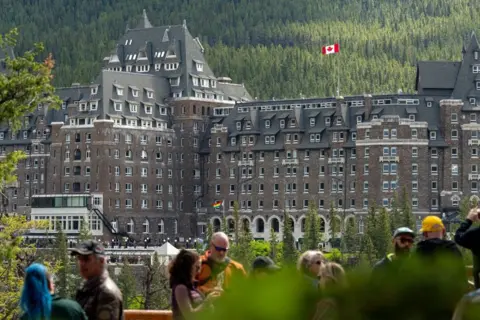 Getty Images
Getty Images
Tourists in Banff, Alberta, near to where the G7 is being held
Tackling Trump over tariffs
The most obvious test of the G7's existential tensions will be Mr Trump's trade war.
This club of some of the world's richest industrial nations was set up in the 1970s to discuss global economic crises. And yet now the G7 finds itself dealing with damaging tariffs imposed by one of its members.
The argument world leaders will make to Mr Trump is that if he wants them to help him counter longer-term threats, economic or otherwise, from China, then it makes little sense for him to punish his allies. They will want to make explicit that there is a trade-off between putting America First and taking on Beijing.
Josh Lipsky, senior director, Atlantic Council's GeoEconomics Center, said: "If the question is how we coordinate on China, how we coordinate on technology, how we coordinate on Russia and Ukraine - how can we have this kind of alliance between advanced-economy democracies if we're also creating economic hardship on our countries by something that's coming from another member?"

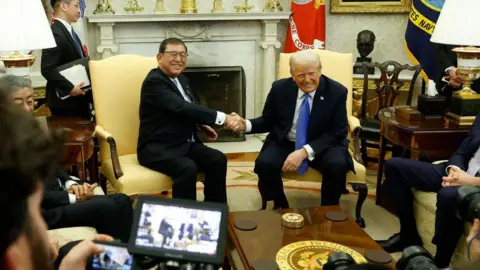 Getty Images
Getty Images
Trump and Japanese Prime Minister Shigeru Ishiba meet in the Oval Office in February.
Pressing Russia over Ukraine
Key to that debate will be Ukraine. President Zelensky will join the discussions on Tuesday. His aim, along with other leaders, will be to assess the current state of President Trump's thinking towards Russia.
Ukraine's allies want to put more pressure on President Putin to come to the negotiating table. To do that, they want to hit his economy harder.
First, they want to reduce the price much of the world pays for Russian oil.
They already agreed in December 2022 to cap the price of Russian crude oil at $60 a barrel, making that a condition of access to western ports and shipping insurance and port. But this has been rendered less effective by falling energy prices.
The European Commission wants a cap at $45. Ukraine wants it even lower, at $30. What is not clear is where Mr Trump's thinking is on this. Already some officials say allies may have to lower the cap without US support.
Second, Ukraine's western allies also want a tough new package of economic sanctions.
The European Commission has already proposed a fresh round of penalties aimed at Moscow's energy revenues, banks and military industry.
US senators, led by Lindsay Graham, are also pushing tough new sanctions that that would impose steep tariffs on countries that buy cheap Russian oil, most particularly China and India.
It used to be said the G7 was a kind of "steering committee" for the free world. This week may reveal whether the club's driving days are over


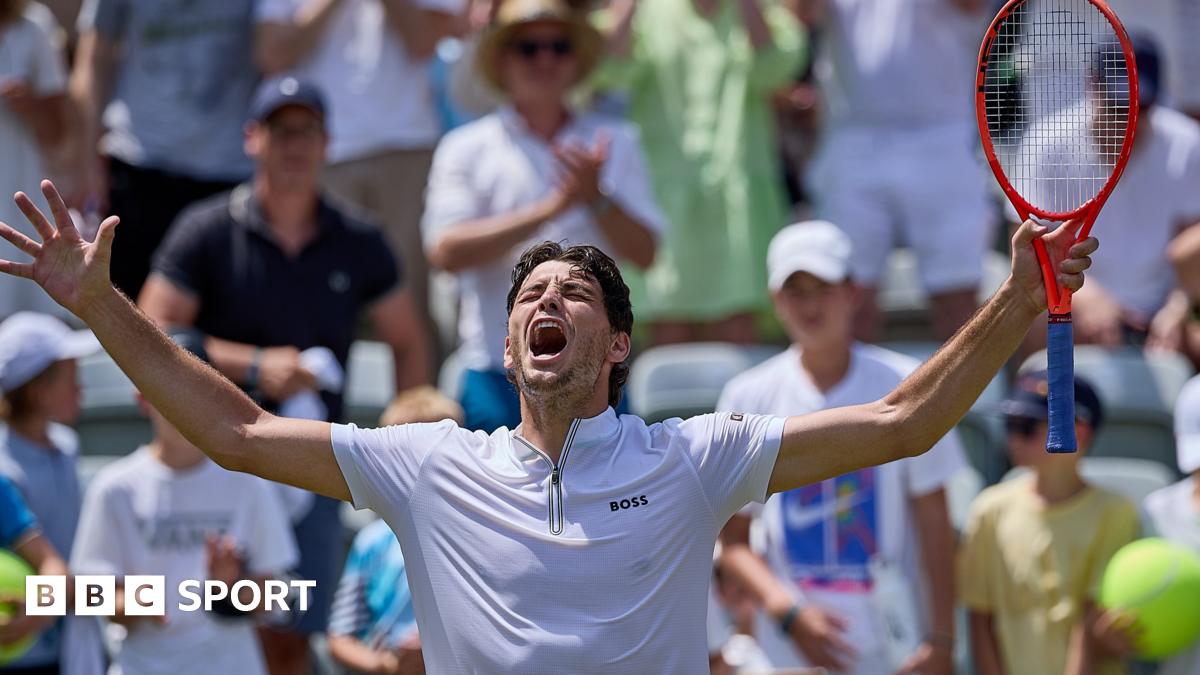
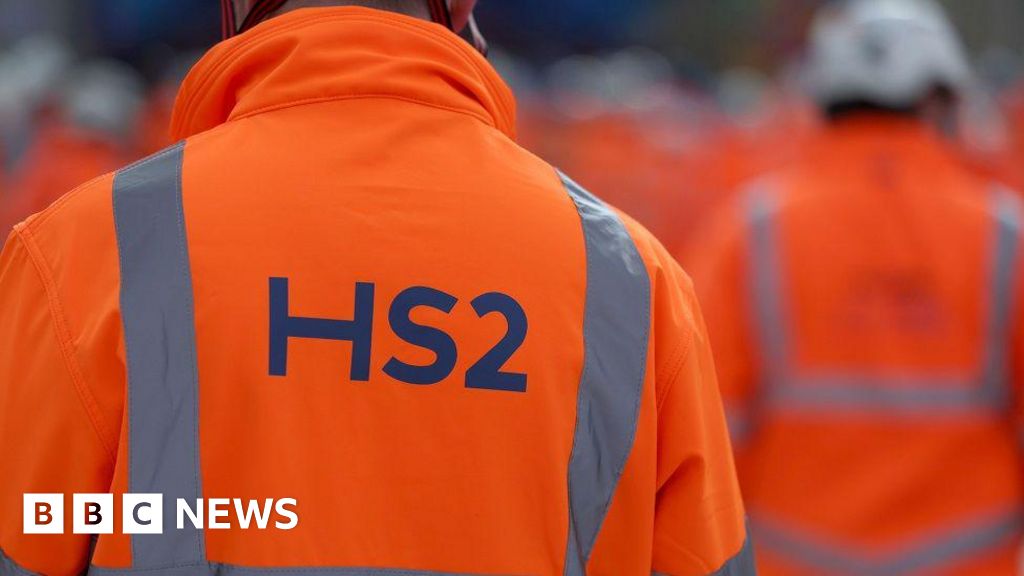

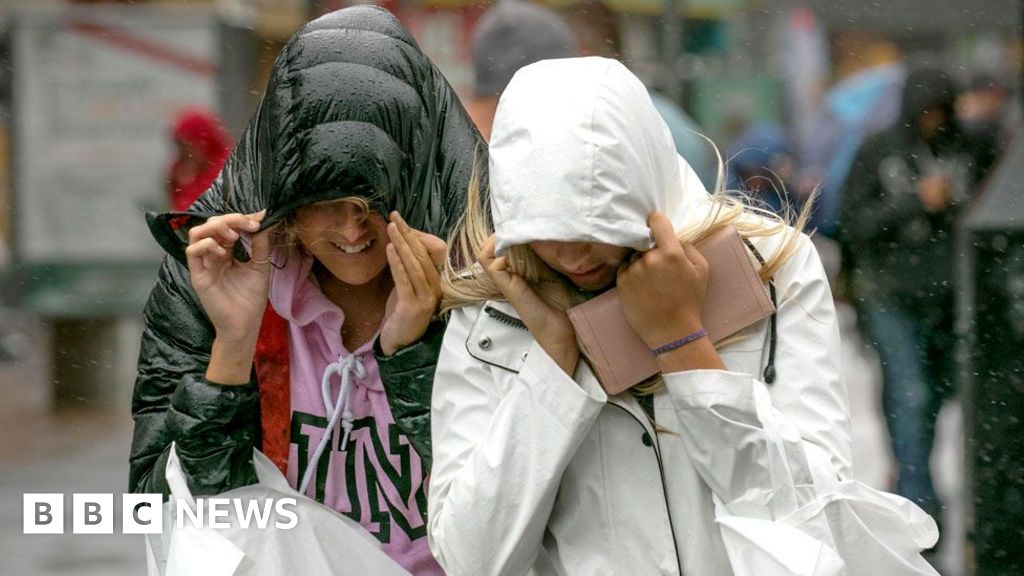



 English (US) ·
English (US) ·